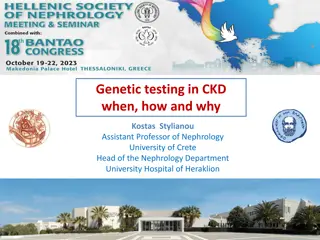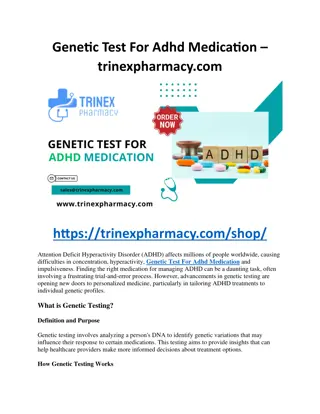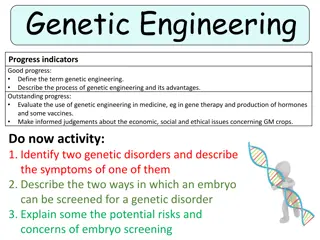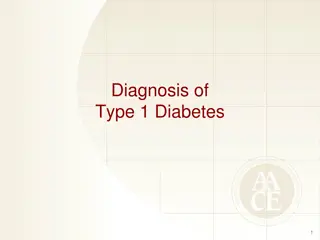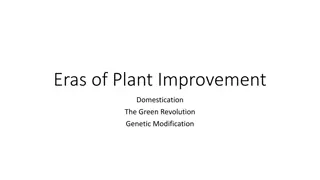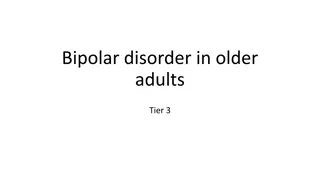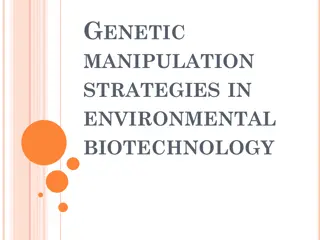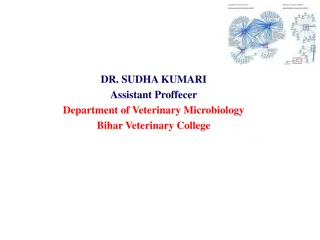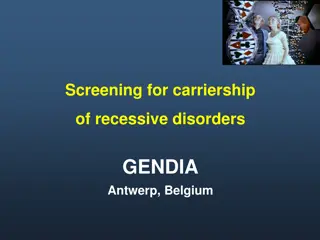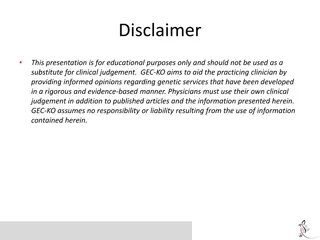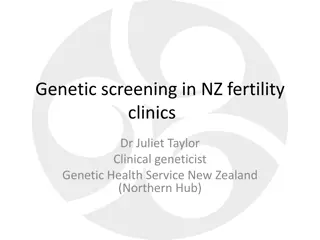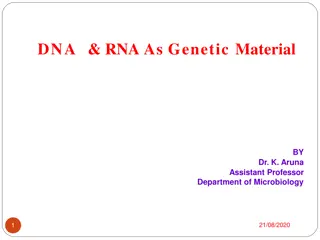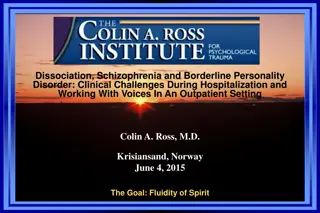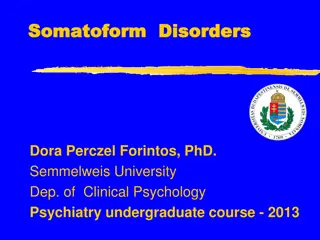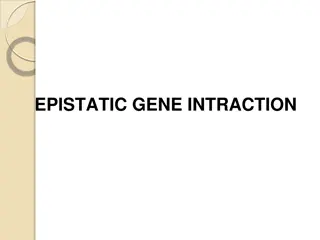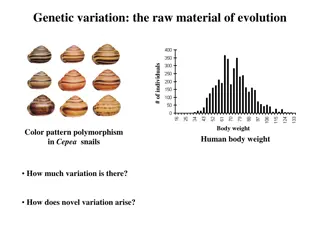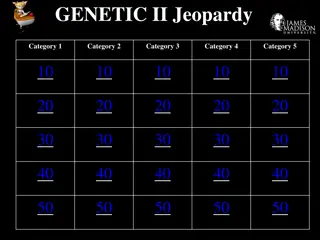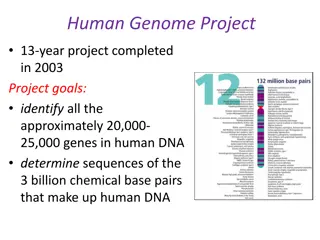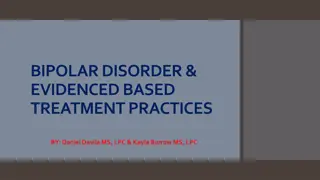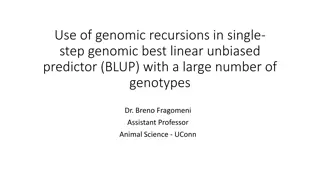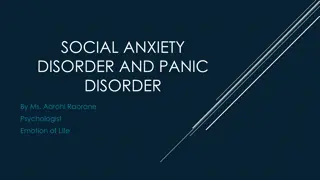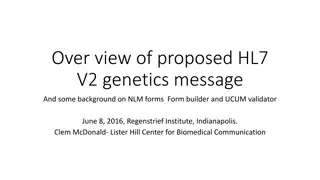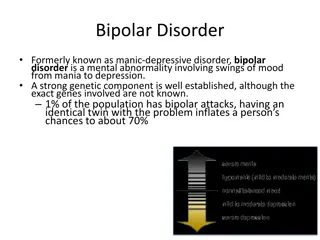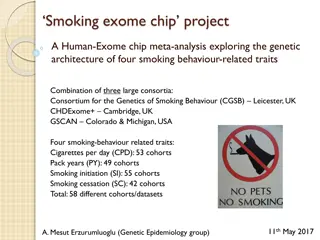Genetic Testing in Chronic Kidney Disease (CKD): Insights and Applications
Genetic testing plays a crucial role in identifying inherited kidney diseases, with around 15% of CKD cases having monogenic causes. Despite a high percentage of patients reporting a family history of CKD, Mendelian causes only account for about 10% of adult ESRD cases. Understanding the genetic bas
1 views • 52 slides
Genetic Test for Adhd Medication - trinexpharmacy.com
Attention Deficit Hyperactivity Disorder (ADHD) affects millions of people worldwide, causing difficulties in concentration, hyperactivity, Genetic Test For Adhd Medication and impulsiveness. Finding the right medication for managing ADHD can be a daunting task, often involving a frustrating trial-a
1 views • 6 slides
Overview of Human Genetic Disorders
Human genetic disorders encompass a range of conditions, from recessive disorders like cystic fibrosis to dominant disorders such as Huntington's disease. Examples include cystic fibrosis, Huntington's disease, and sickle-cell anemia. Understanding genetic disorders involves research and awareness o
0 views • 10 slides
Understanding Anxiety Disorders and Related Conditions
Explore the distinguishing features of anxiety disorders such as generalized anxiety disorder, panic disorder, and phobias, along with insights into obsessive-compulsive disorder (OCD) and posttraumatic stress disorder (PTSD). Delve into the impact of conditioning, cognition, and biology on these co
2 views • 46 slides
Unraveling a Puzzling Blood Disorder: A Genetic Inquiry
A Chicago physician, Dr. James Herrick, encountered a mysterious blood disorder in a West Indies student back in 1904. This condition, characterized by fatigue, joint pain, yellowish eyes, and an affected family history, poses a genetic inheritance puzzle. Investigations into Mendelian inheritance p
0 views • 16 slides
Exploring Genetic Engineering: From Basics to Applications
Genetic engineering involves altering the genetic material of organisms to achieve desirable traits. This process entails cutting out specific genes from one organism and transferring them to another. In medicine, genetic engineering finds applications in gene therapy, hormone production, and vaccin
0 views • 12 slides
Understanding Genetic Markers in Molecular Mapping
Genetic markers play a crucial role in gene mapping within molecular biotechnology. They are fragments of DNA associated with specific genomic locations, aiding in identifying DNA sequences and analyzing genetic variation. Various types of genetic markers such as RFLP, SSR, and SNP offer insights in
1 views • 26 slides
Understanding Genetics: Mutations, Chromosomal Aberrations, and Genetic Engineering
Genetic mutations can be harmless, harmful, or beneficial, leading to variations within a species. Examples of gene mutations and chromosomal aberrations, like Trisomy 21, illustrate genetic abnormalities. The increase in Down Syndrome cases with maternal age highlights a maternal age effect. Geneti
0 views • 17 slides
Exploring Genetic Engineering: A Journey into Manipulating Organisms
Delve into the world of genetic engineering, where organisms' genetic makeup is altered for various purposes. Discover the process of modification, the history of genetic manipulation, and the impact of genetically modified organisms on society and science.
0 views • 20 slides
Improving Microbial Productivity and Characteristics for Industrial Applications
Efforts to enhance the productivity of natural isolates for commercial products involve genetic modifications through mutation, genetic recombination, and genetic engineering techniques. Desired characteristics include genetic stability, efficient production, versatility in carbon sources, and ease
1 views • 25 slides
Classification and Genetic Defects of Diabetes
The diagnosis and differential diagnosis of Type 1 and Type 2 diabetes are discussed, detailing the clinical courses, age of onset, body weight characteristics, onset patterns, and genetic factors. The etiologic classification of diabetes including insulin-deficient, immune-mediated, monogenic, and
0 views • 16 slides
Evolution of Plant Improvement: Domestication to Genetic Modification
Plant improvement has evolved through different eras - from ancient domestication to the Green Revolution and genetic modification. Domestication shaped major crops over millennia, the Green Revolution introduced high-yielding varieties, and genetic modification allows direct genetic alterations for
0 views • 6 slides
Understanding Bipolar Disorder in Older Adults
Bipolar disorder in older adults can have a later onset, often after the age of 50, with episodes of mania and depression. Recognizing symptoms like excessive energy, inability to sleep, and cognitive impairment is crucial. Late-onset bipolar disorder differs from early-onset in familial illness rat
1 views • 12 slides
Genetic Manipulation in Environmental Biotechnology
Genetic manipulation strategies in environmental biotechnology involve techniques like gene splicing and molecular cloning to modify genes directly. These methods have various applications such as isolating genes, producing specific molecules, improving biochemical production, creating organisms wit
0 views • 20 slides
Understanding Bacterial Transformation in Molecular Biology
Transformation in molecular biology is a process where genetic material is altered by the uptake of exogenous DNA. It involves the direct incorporation of genetic material into a cell, leading to genetic changes. This phenomenon was first demonstrated by Frederick Griffith in 1928. The process of tr
1 views • 25 slides
Understanding Genetic Counselors and the NSGC
Genetic counselors play vital roles in healthcare by assisting patients with genetic conditions, advocating for their needs, educating providers, conducting research, and influencing public policy. The National Society of Genetic Counselors (NSGC) supports genetic counselors in their professional en
3 views • 12 slides
Effective Strategies for Children with Developmental Language Disorder, Sensory Processing Disorder, and Fine Motor Delays
Children with Developmental Language Disorder (DLD), Sensory Processing Disorder (SPD), and Fine Motor Delays often have accompanying sensory and fine motor deficits. Research indicates that addressing sensory processing deficits can significantly benefit children with DLD, ADHD, autism, and other d
0 views • 61 slides
Genetic Carrier Screening for Recessive Disorders by GENDIA, Antwerp, Belgium
Explore the world of genetic carrier screening offered by GENDIA in Antwerp, Belgium. Learn about prenatal screening for various genetic disorders, including Down syndrome and severe monogenic disorders. Discover the frequency of common recessive disorders and the severity of genetic diseases. Uncov
0 views • 17 slides
Exploring Expanded Carrier Screening in Family Planning
Learn about expanded carrier screening as a tool for identifying genetic risks in family planning scenarios. Understand the importance of genetic testing, considerations for non-consanguineous couples like Julie and Chris, and the evolving landscape of genetic services. Explore key aspects such as f
1 views • 36 slides
Genetic Screening and Reproductive Carrier Testing in New Zealand Fertility Clinics
Genetic screening and reproductive carrier testing play crucial roles in identifying and managing genetic disorders in couples planning for pregnancy. While carrier screening is recommended for all couples, it is not widely followed in New Zealand. Pre-conceptual reproductive carrier screening is no
0 views • 19 slides
Understanding Direct-to-Consumer Genetic Testing: Cases and Considerations
Explore real-life scenarios of individuals opting for Direct-to-Consumer Genetic Testing (DTC-GT) to assess genetic risk for various health conditions. Consider the implications, limitations, and cautions associated with DTC-GT, highlighting the importance of comprehensive evaluation and genetic cou
0 views • 39 slides
Understanding Genetic Disorders and Their Impact on Health
Genetic disorders are caused by abnormalities in genes or chromosomes, leading to various health conditions. Inherited disorders can be passed down from parents to children, affecting physical makeup and processes in the body. In India, there is a high prevalence of genetic disorders, particularly i
1 views • 12 slides
Understanding DNA and RNA as Genetic Material
Genetic material plays a crucial role in the transmission of traits from one generation to the next. This article explores the significance of DNA and RNA as genetic material, highlighting key experiments and discoveries that demonstrate DNA's role in carrying hereditary information. From Mendel's h
0 views • 32 slides
Understanding Schizophrenia, Dissociation, and Borderline Personality Disorder
Clinical challenges and treatment approaches for schizophrenia, dissociative identity disorder, and borderline personality disorder are discussed in this content. The genetic and environmental factors influencing these conditions are explored, along with insights from twin studies and treatment effi
0 views • 23 slides
Understanding the Key Articles of the Nagoya Protocol on Access to Genetic Resources and Benefit-Sharing
The Nagoya Protocol aims to promote fair sharing of benefits from genetic resources utilization for conservation efforts. It encompasses access, technology transfer, funding, and respect for rights over resources and technologies. The protocol applies to genetic resources, traditional knowledge, and
1 views • 19 slides
Understanding Somatoform Disorders: Symptoms, Diagnosis, and Treatment Options
Somatoform disorders are characterized by physical symptoms that mimic general medical conditions without an underlying medical or mental disorder. Patients often exhibit somatic symptoms without an organic basis, have poor insight, and do not find reassurance helpful. Common types include somatizat
0 views • 46 slides
Understanding Epistasis: Genetic Interactions and Their Implications
Epistasis is a phenomenon where the phenotypic expression of one gene is influenced by interactions with another gene. This concept, first introduced in 1909, plays a crucial role in genetics, affecting various traits and evolutionary processes. The difference between dominance and epistasis lies in
0 views • 41 slides
Understanding Genetic Variation and Its Role in Evolution
Genetic variation is crucial for evolution, providing the raw material for adaptation and species diversity. Phenotypic variation can arise from differences in genotype, environment, or their interaction. Studying genetic variation through statistical analysis and at the molecular level helps us unr
0 views • 47 slides
Genetics II Jeopardy: Linked Genes, Genetic Mapping, and Sex Chromosomes
Explore the world of genetics with Genetics II Jeopardy, covering topics such as linked genes, genetic mapping, sex chromosomes, and inheritance patterns. Discover the significance of gene location on chromosomes, the concept of recombination frequency, and the role of specific genes like SRY in mal
0 views • 26 slides
Evolutionary Computation and Genetic Algorithms Overview
Explore the world of evolutionary computation and genetic algorithms through a presentation outlining the concepts of genetic algorithms, parallel genetic algorithms, genetic programming, evolution strategies, classifier systems, and evolution programming. Delve into scenarios in the forest where gi
0 views • 51 slides
Understanding Genetic Disorders and the Human Genome Project
The Human Genome Project, completed in 2003, aimed to identify all human genes and DNA sequences. Genetic disorders, like autosomal disorders and Huntington's disease, can result from mutations at different levels, affecting single genes, chromosomes, or multiple genes. Albinism and cystic fibrosis
0 views • 37 slides
Understanding Bipolar Disorder and Evidence-Based Treatment Practices
This presentation by Daniel Davila, MS, LPC, and Kayla Burrow, MS, LPC delves into the complexities of bipolar disorder, potential crisis outcomes, and mental illness management through evidenced-based treatment practices. Topics covered include bipolar diagnosis, assessing disorder lethality, treat
0 views • 44 slides
Genomic Recursions in Genomic BLUP for Animal Breeding
Explore the application of genomic recursions in single-step genomic best linear unbiased predictor (BLUP) for genetic evaluations in animal breeding. Understand the significance of using genomic data to improve genetic selection, increase accuracy, shorten generation intervals, and enhance genetic
0 views • 31 slides
Psychiatrist for bipolar disorder
Bipolar Disorder is a brain disorder characterized by extreme mood changes; manic or hypomanic episodes and mixed episodes with depressive episodes. In the following blog post, the best psychiatrist for bipolar disorder treatment, Dr. Gorav Gupta, el
0 views • 7 slides
Understanding Genetic Variants Associated with Bipolar Disorder and Schizophrenia
This material covers the genetic variants linked to bipolar disorder (BD) and schizophrenia, focusing on the rs1064395 variant in the neurocan gene (NCAN). The study analyzed a cohort of 682 patients with BD and 1300 controls to identify associations with the disorder. The presentation emphasizes th
0 views • 22 slides
Understanding Social Anxiety Disorder and Panic Disorder
Social anxiety disorder and panic disorder are common mental health conditions characterized by intense feelings of fear and anxiety in social situations. Individuals with these disorders may experience physical symptoms such as trembling, racing heart, and upset stomach, along with emotional signs
0 views • 18 slides
Overview of HL7 V2 Genetics Messaging and LOINC Genetic Testing Codes
This content delves into the proposed HL7 V2 genetics message, NLM forms builder, UCUM validator, and the current state of genetic testing codes in LOINC. It discusses the types of molecular genetic tests present in LOINC and the evolution towards newer genetic tests. The content also covers how LOI
0 views • 21 slides
Understanding Mental Health Disorders: Bipolar Disorder, Anxiety Disorders, & More
Exploring various mental health disorders such as Bipolar Disorder, Anxiety Disorders, Generalized Anxiety Disorder, Panic Disorder, and Phobic Disorders. Learn about their symptoms, prevalence, and impacts on individuals' lives.
0 views • 41 slides
Understanding GWAS: A Brief Overview of Genetic Association Studies
GWAS, or Genome-Wide Association Studies, are a method used to map genes associated with traits or diseases by analyzing genetic markers throughout the genome. This process involves statistically testing the association between SNPs and traits using regression or chi-squared tests in a hypothesis-fr
0 views • 19 slides
Genetic Architecture of Smoking Behavior Traits: Meta-Analysis Insights
Exploring the genetic basis of smoking behavior-related traits through a meta-analysis combining data from three large consortia across 58 different cohorts/datasets. The study investigates genetic variants associated with cigarettes per day, pack years, smoking initiation, and smoking cessation. Ov
0 views • 34 slides
